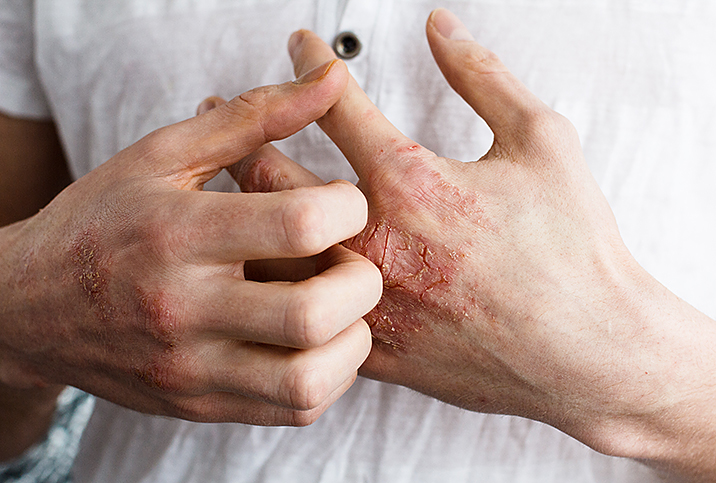Identifying Triggers, Types, and Risk Factors of Eczema

Key Points
- Eczema may start at any age, but often begins in childhood. Up to 1 in 5 children may be affected by eczema.
- Talk to your sexual partners about how eczema affects you.
- Eczema is different for everyone, from the age of onset to the severity and extent of the condition, and the types of triggers causing flare-ups.
Eczema, or atopic dermatitis, can be visible and may be embarrassing, especially in sexual situations. It's natural to feel self-conscious during sex even without a skin condition, so adding eczema to the mix can compound insecurities.
So what can you do to reduce your risk and the stress-induced triggers of eczema?
What is eczema?
Eczema is a common skin condition. In the United States, more than 30 million people suffer from eczema, between 2 to 10 percent of adults in the U.S., shared a 2024 report.
"Eczema, also known as atopic dermatitis, is a skin problem causing dry, itchy, scaly and red skin," said Brian Moore, MD and dermatology advisor at Illuminate Labs. "It can affect infants, children and adults and seems more common in certain families. Eczema can be treated with moisturizers and prescription ointments and creams," Moore said.
Where does the term eczema come from?
"Eczema comes from the Greek word 'to boil' and describes red, dry and itchy skin that can weep, blister and crust, and the skin can become thickened," said Daniel Glass, consultant dermatologist at Dermatology Clinic London.
"Eczema may start at any age, but the onset is most often in childhood. Up to 1 in 5 children may be affected by eczema."
Speak with your potential sexual partners about your eczema so they know what to expect.
Eczema causes and triggers
The cause of eczema isn't entirely understood, but genetics appear to play a strong role. Those with a family history of eczema are at increased risk of developing the condition.
"In most people with eczema, there is a genetic abnormality in the outermost layer of the skin, called the epidermis. The epidermis is the first line of defense between the body and the environment," Moore said.
"When the epidermis is intact, it keeps environmental irritants, allergens and microbes from entering the body and prevents the skin from losing too much water. In people with eczema, this barrier is less strong and more permeable than it should be," Moore finished.
Most people with eczema develop their first symptoms as children and before 5 years old. However, despite popular belief, Moore added, eczema is rarely linked to food allergies in children.
Symptoms of eczema include:
- Intense itching of the skin
- Patches of inflamed skin
- Small bumps
- Skin flaking
Scratching can further inflame the skin and worsen the itching, and the itchiness may be more noticeable at nighttime.
"Like most other skin conditions, eczema is a mixture of genetics and environment," Glass said. "Many environmental factors can cause flare-ups, such as dust, heat, dry air, pets, soaps and detergents as well as some medications.
Other triggers are the use of soaps which strip the skin of natural oils, bacterial or viral infections on the skin, and stressful events in your life.
"If you have a predisposition to eczema, flares in eczema can be triggered by environmental things such as the cold. Eczema often gets a bit worse during the winter months," Glass said.
"The air outside is drier and colder, and the air inside the house is dry because of the central heating. This can make your skin drier and you will need to put emollients (also known as a moisturizer) on your skin to reduce the intensity of eczema flare-ups."
The risks of eczema
If eczema is left untreated, it can lead to bacterial skin infections, Glass said. It can also have a significant impact on a person's emotional well-being and quality of sleep.
Sometimes eczema is overlooked because it looks similar to other conditions. Conversely, other conditions could be misdiagnosed as eczema. For example, a symptom of syphilis is a skin rash or skin irritations.
It's important to get an accurate diagnosis.
If you think you may have eczema, make an appointment with your healthcare provider to discuss your symptoms, visible and not, so your condition can be accurately diagnosed and treated.
The various ways people experience eczema
"Eczema symptoms can vary from one person to another and change over time. There may be inflamed, scaly and crusted areas on the front of the arms, legs and cheeks," Moore said.
"Commonly, eczema affects the back of the neck, the elbow creases and the backs of the knees. The skin may become thickened and darkened, or even scarred, from repeated scratching."
Glass agreed eczema is different for everyone, from the age of onset to the severity and extent of the condition, and the types of triggers causing flare-ups. Glass outlined a few of the different types of eczema people can experience.
- Allergic contact dermatitis: Caused by an allergic reaction to something in contact with your skin, such as hair dye or perfume.
- Asteototic eczema: Occurs with age and results in areas of dry, scaly skin, particularly on the lower legs.
- Atopic eczema: Linked to other allergic conditions like hay fever and asthma. These conditions lead to increased activity of the body's immune system which in turn causes reactions to substances which otherwise would not be harmful.
- Drug-induced eczema: Caused by certain prescribed medications.
- Dyshidrotic/pompholyx eczema: Occurs under the skin on the hand and feet in the form of tiny blisters.
- Irritant contact eczema: caused by a chemical such as disinfectants or soap irritating the skin.
- Lichen simplex chronicus: Caused by repeated scratching and rubbing.
- Nodular prurigo: Multiple small, itchy areas of inflamed, thickened skin.
- Seborrheic dermatitis: Affects parts of the body covered by hair, particularly the scalp and face. This is also known as 'cradle cap' when it affects babies.
Current and upcoming clinical trials
An ongoing study is looking at the natural history of diseases to allergic inflammation, such as atopic dermatitis or genetic disorders associated with allergic inflammation. Since eczema appears to be a genetic condition with some allergy associations, it makes sense eczema would be a part of this study.
Since there is currently no cure for eczema, there may be a clinical trial in your area.
Review these options with your healthcare provider to ensure they are relevant to your condition. But if you'd like to do a little digging on your own first, look into the National Eczema Association.
Here are some other links you might find useful:
- Northwestern Medicine
- Oregon Health & Science University
- University of California San Francisco
- Giddy
The bottom line
Eczema is a common skin condition affecting millions of people around the world. Work with your healthcare provider to determine the best way to treat your eczema and how to reduce your triggers.


















